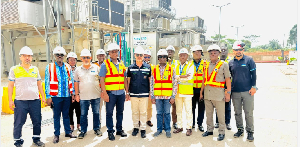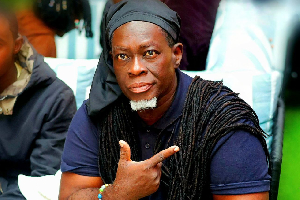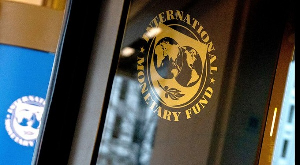K. B Asante, Kwesi Jonah & Lord Commey’s assessment of the NPP and President Kufuor on the occasion of the 2nd anniversary of the December 08, 2004 election
Friday December 08 marked exactly two years after the election that ushered the ruling New Patriotic Party (NPP) and President John Kufuor into its second term. The opposition National Democratic Congress (NDC) is in court though, over the results of that election.
The day passed almost unnoticed, but at the Castle, friends and family of the President made merry as he celebrated his 68th birthday.
Two years after ‘winning’ that election, the NPP, according to independent analysts has been unable to satisfy the broad mass of the population including (even) its own supporters. This is in spite of the fact that the same analysts and commentators agree that there has been improvements to the respect of people’s freedoms (one fact many people agree to, though some insist that there are people who are suffering quietly) and positive macro economic policies (but which are not been felt by the people).
But with many more promises made to Ghanaians by the party and President Kufuor, in the midst of mounting scandals some of which are (un)successfully pushed underground with the help of an increasing number of radio propagandists, dailyEXPRESS sought the views of three personalities on the performance of the government.
Mr. Kwesi Jonah
Head of Governance, IEA; Lecturer, Political Science Dept, UoG.
According to Mr. Kwesi Jonah, the NPP recorded TOO MANY low points within the last two years.Speaking from a governance perspective, the University don referred to the African Peer Review Mechanism report on Ghana, saying absolutely nothing has been done by the Kufuor administration to address the issues complained about and for which some recommendations were made.
“Nothing has been done to place a ceiling on the appointment of justices to the Supreme Court, the size of government has not been reduced and the issue surrounding the Ministry of Parliamentary Affairs is still unresolved.”
According to him, contrary to the promise made to Ghanaians that decentralization will be deepened, the process has not been completed, six years after the promise. He added that local government powers are still not transferred and many institutions are still being run from the ministries in Accra.
“This is not good enough” he says.
On the issue of corruption and coming in the wake of the recent dip in the country’s performance on the Transparency International (TI) Corruption Perception Index, Mr. Jonah said political corruption is still very rife despite the promise of zero tolerance for corruption.
“What we want to see concerning corruption is concrete independent institutions with the necessary authority to address the problem” adding that the existing anti-corruption institutions such as the Serious Fraud Office and the Commission on Human Rights and Administrative Justice lack independence and cannot confront the issues of political corruption.
He also noted that the current state of guinea worm infestation in Ghana is very embarrassing to the nation. According to Mr. Jonah, it is regrettable that nothing has been done this area in the last two years.
Mr. Jonah however agrees with retired diplomat K. B. Asante that there are some modest achievements to be credited to the government.
“People feel quite free now than before, there is no harassment of the media” he admitted, commending government further for the new pension scheme, the school feeding programme and the capitation grant which has combined to help increase basic school enrolment.
Mr. K. B. Asante
Minister of state in the First Republic
PNDC Secretary of State
Former Diplomat; Respected Educationist & Statesman
The retired diplomat who currently leads the GaDangbe Council rated the government’s performance over the last two years as “relatively fair” acknowledging within the period “the media is reasonably free, there have been no unnecessary hiccups and the country is doing well in its democratization efforts.”While many will probably agree with him, there are others who have other concerns beyond freedom. And according to Mr. Asante who has worked in almost all governments since Independence, it is obvious that many Ghanaians are unhappy and are frustrated.
“Despite statistics about government’s improved economic performance, many still don’t understand why such figures are not reflecting in their pockets” he said.
Mr. Asante says the fight against corruption appears to have been lost within the last two years, adding that there have not been changes at all in dealing with corruption under the Kufuor administration.
Allegations of corruption have been rife within the current tern of the president, starting with his alleged (but cleared by the Commission on Human Rights & Administrative Justice) involvement in and use of ‘Gestapo-style’ tactics to buy what has become known as the Hotel Kufuor and Dr. Richard Anane’s alleged transfer of Ghana Airways money to his American mistress among others.
Unfortunately, the much respected Transparency International’s (TI) Corruption Perception Index has also not been helpful to the government, and since its release, government and its spokespersons have stopped at nothing to ‘discredit’ the report.
But the retired diplomat avers that perceived corrupt officials must be severely punished regardless of their status in government, explaining further that if such things are not happening even where there is evidence, there is no way the cancer of corruption can be reduced in Ghana.
Mr. Asante also referred to the issue of tribalism, insisting that the negative perception of ethnicity and tribalism under the NPP must be vigorously dealt with. According to him, even though the facts on the ground do not support such perceptions, many Ghanaian hold a strong view that only a small click of persons from a particular tribe are running the game. This he says does not auger well for the health of the nation and must be addressed.
Within the first year of the NPP’s second term, the first family came under intense scrutiny and received unfavourable publicity over the alleged purchase of the 3.5 million dollar hotel facility referred to earlier, using his son John Addo Kufuor as a front.
At the centre of the allegations was a certain Gizelle Yajzi who was brought in by the president as an Economic Adviser and reportedly assisted them to secure support from Kuwait. In the midst of the Hotel Kufuor saga, Madam Yajzi’s outbursts brought more pressure and embarrassment to the presidency and the NPP when she confirmed what had all along been rumours that she gave birth to twins (John and Philip Kufuor) for the president.
The issue dominated the media for a very long time with the opposition in parliament declaring their preparedness to commence impeachment procedures against President Kufuor should he be found guilty.
This was happening alongside then Minister for Road Transport Dr. Richard Anane’s extra marital affair with an American woman which resulted in the birth of little Anane, amidst allegations of neglect and conflict of interest against the minister.
On what lessons Ghanaians should learn from such developments, Mr. Asante indicated that people in positions of authority, trust and importance must be aware of what they do and how they behave in order to avoid unnecessary humiliation.
The former PNDC Secretary for Education further indicated that the numerous cases of police brutality and deaths from mistaken identity constitute a serious blight on the human rights records of the government. He cautioned the police to be careful of the way they use their authority.
On the way forward, Mr. Asante suggested that within the last two years of their administration, the NPP and President Kufuor should focus attention on reducing extreme poverty, indiscipline, excessive noise making, decongesting and cleaning up the city of Accra.
Mr. Lord Commey National Organizer, NPP
Speaking to the dailyEXPRESS, Mr. Commey disagreed with our independent analysts’ views as it relates to what they see are clear weaknesses or negatives in the last two years.
According to him, the party’s Positive Change Chapter II is firmly on course.
Mr. Commey says the government’s “macroeconomic performance is excellent, growth is accelerating, business is growing, there is good governance, and our international image is growing with enormous financial support from the international donor community.”
Reacting to some of the issues raised by Messrs K. B. Asante and Kwesi Jonah, the NPP national Organizer said “our solid performances in Chapter I made the people of Ghana vote for us in 2004 and under Chapter II, the reconstruction we begun is still on. The core areas of government under ‘Positive Change Chapter II’- good governance, human resource development, and private sector development are on course.”
On political corruption, Mr. Commey agrees that it is a canker that must be fought, but says it is for us all to fight.
“Corruption does not come from government appointees alone. We need to stop making it a political issue. Government has put in measures to address the menace. The reform of the public sector with regard to the passage of the public procurement law, the strengthening of independent institutions like the CHRAJ are all efforts at dealing with perceived corruption in the country.”
Mr. Commey disagrees that noted instances of police brutalities within the last two years do not necessarily constitute a blight on the human rights record of the NPP government. He said “such things should be seen as institutional failures of the police administration. But we should also recognize the efforts of government in dealing with the problem. The various committees of investigation into such cases as we have seen in the last two years show government’s commitment in addressing the issues.”
Lord Commey however admits that government’s inability to effectively tell its own story to the people of Ghana is a critical low-point.
“It is important for government to tell its own story. But one weakness so far has been the inability to effectively disseminate information to the people,” he concedes.
In his usual combative manner, Laud Commey rejects suggestions that the much touted macroeconomic stability is not translating into the lives and pockets of Ghanaians.
“These claims are completely false. These are just wicked propaganda being thrown about by the opposition and unfortunately, they seem to be succeeding. These days, there are no free monies again. Unlike the past, the ghost names have been removed; frivolous contract deals have been ceased.”
“Rural people are better of now than ever as a result of the capitation grant and the school feeding policies which now keep money in the pockets of parents”, he further argued.












